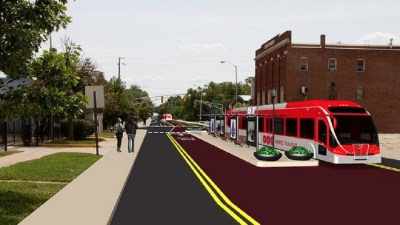Congress Sells Out Non-Drivers by Reauthorizing FAST Act

Congress passed a short-term spending bill on Tuesday that will renew funding for our existing car-focused infrastructure for another year, missing an historic opportunity to reform a broken system that’s killing our planet and thousands of people in an ongoing traffic violence pandemic.
The bipartisan House Continuing Appropriations Act 2021, which includes a one-year reauthorization of the Fixing America’s Surface Transportation (FAST) Act, passed 359 to 57 (with progressive Democratic Rep. Alexandria Ocasio-Cortez protesting by merely voting “present”) and is expected to glide through the GOP-controlled Senate.
The move will help avoid a government shutdown just days before the FAST Act is due to expire on Sept. 30 — but it comes at the expense of transportation funding reform that transit and active transportation advocates say is long overdue.
House Democrats put forward an alternative infrastructure bill, the INVEST Act, as part of the Moving Forward Act early in July. The forward-thinking legislation would have upped funding for traffic violence prevention initiatives and active transportation infrastructure, as well as placing guardrails around states’ ability to build new highways before they repair the ones they already have. INVEST garnered the support of prominent organizations like the Safe Routes to School Partnership and Transportation for America, but was declared dead on arrival by Senate Majority Leader Mitch McConnell, who called it “a Green New Deal masquerading as a highway bill.”
McConnell will get his desired highway bill with the renewal of FAST, which devotes less than 2 percent of transportation dollars to active transportation and just 17 percent to public transit, while pouring about 80 percent into roads and interstates. That’s roughly on par with the funding distribution proposed by Senate Republicans in 2019 in their own America’s Transportation Infrastructure Act, though FAST will actually give states a little more money for highways and transit next year than the conservatives’ proposed reform legislation would have (roughly $61 billion compared to $57.4 billion.)
Sustainable transportation activists have mixed feelings on the reauthorization of the bill — particularly when it comes to its continued lack of support for vulnerable road users. A recent poll from the League of American Bicyclists found that when they were told how few of their tax dollars went to supporting bikers, walkers and wheelchair users, 60 percent of Americans across all demographics thought active modes should get more — the highest level of public support in the eight years of the survey.

Still, some advocates are crossing their fingers that Washington lawmakers will make a little room for non-drivers as amendments are introduced.
“We’re hoping Congress will respect the desire of 60 percent of Americans to increase funding for bicycling and walking, and to see bicycling as a critical part of a equitable transportation system — and part of the solution to recovering from COVID, building back local economies and to solving the climate crisis,” said Caron Whitaker of the League of American Bicyclists. “Our strongest support remains among Democrats, Black Americans, people living in cities and parents.”
Even if the bill sails through without changes, at least its renewal will only last for a year — after which a possibly very different House and Senate will have a chance at crafting another five-year transportation bill. Until then, Americans may simply be stuck with the status quo.

